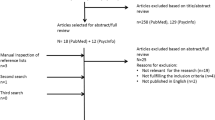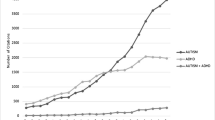Abstract
Attention-deficit/hyperactivity disorder (ADHD) commonly co-occurs in autistic children. However, additional research is needed to explore the differences in motor skills and sensory features in autistic children with and without ADHD, as well as the impacts of these factors on daily living skills (DLS). This observational study sought to fill this gap with 67 autistic children (6.14–10.84 years-old), 43 of whom had ADHD. Autistic children with ADHD demonstrated higher sensory features and lower motor skills than autistic children without ADHD. In examining autism and ADHD features dimensionally, we found that overall sensory features, seeking, and hyporesponsiveness were driven by both autism and ADHD features, whereas motor skills, enhanced perception, and hyperresponsiveness were driven by only autism features. Additionally, in using these dimensional variables of autism and ADHD features, we found that differences in motor skills, sensory and autism features, but not ADHD features, impact DLS of autistic children, with autism features and motor skills being the strongest individual predictors of DLS. Together, these results demonstrate the uniqueness of motor skills and sensory features in autistic children with and without ADHD, as well as how autism features, sensory features, and motor skills contribute to DLS, emphasizing the importance of a comprehensive understanding of each individual and complexities of human development when supporting autistic children.


Similar content being viewed by others
References
Abu-Akel, A., Allison, C., Baron-Cohen, S., & Heinke, D. (2019). The distribution of autistic traits across the autism spectrum: Evidence for discontinuous dimensional subpopulations underlying the autism continuum. Molecular Autism. https://doi.org/10.1186/s13229-019-0275-3
American Academy of Pediatrics, & National Initiative for Children’s Healthcare Quality (2002). NICHQ Vanderbilt Assessment Scales. https://www.nichq.org/sites/default/files/resource-file/NICHQ-Vanderbilt-Assessment-Scales.pdf.
American Psychiatric Association. (2013). Diagnostic and statistical Manual of Mental disorders, Fifth Edition. American Psychiatric Association. https://doi.org/10.1176/appi.books.9780890425596.
Arnett, A. B., & Flaherty, B. P. (2022). A framework for characterizing heterogeneity in neurodevelopmental data using latent profile analysis in a sample of children with ADHD. Journal of Neurodevelopmental Disorders, 14(1), 45. https://doi.org/10.1186/s11689-022-09454-w.
Baranek, G. T. (2009). Sensory experiences questionnaire version 3.0. Unpublished Manuscript.
Bard, D. E., Wolraich, M. L., Neas, B., Doffing, M., & Beck, L. (2013). The psychometric properties of the Vanderbilt attention-deficit hyperactivity disorder diagnostic parent rating scale in a community population. Journal of Developmental & Behavioral Pediatrics, 34(2), 72–82. https://doi.org/10.1097/DBP.0b013e31827a3a22.
Ben-Sasson, A., Gal, E., Fluss, R., Katz-Zetler, N., & Cermak, S. A. (2019). Update of a meta-analysis of sensory symptoms in ASD: A new decade of research. Journal of Autism and Developmental Disorders, 49, 4974–4996. https://doi.org/10.1007/s10803-019-04180.
Benjamini, Y., & Hochberg, Y. (1995). Controlling the false discovery rate: A practical and powerful approach to multiple testing. Journal of the Royal Statistical Society: Series B (Methodological), 57(1), 289–300. https://doi.org/10.1111/j.2517-6161.1995.tb02031.x.
Bhat, A. N. (2021). Motor impairment increases in children with autism spectrum disorder as a function of social communication, cognitive and functional impairment, repetitive behavior severity, and comorbid diagnoses: A SPARK study report. Autism Research, 14(1), 202–219. https://doi.org/10.1002/aur.2453.
Bhat, A. (2023). Multidimensional motor performance in children with autism mostly remains stable with age and predicts social communication delay, language delay, functional delay, and repetitive behavior severity after accounting for intellectual disability or cognitive delay: A SPARK dataset analysis. Autism Research, 16(1), 208–229. https://doi.org/10.1002/aur.2870.
Bhat, A. N., Boulton, A. J., & Tulsky, D. S. (2022). A further study of relations between motor impairment and social communication, cognitive, language, functional impairments, and repetitive behavior severity in children with ASD using the SPARK study dataset. Autism Research, 15(6), 1156–1178. https://doi.org/10.1002/aur.2711.
Bishop, S. L., Hus, V., Duncan, A., Huerta, M., Gotham, K., Pickles, A., Kreiger, A., Buja, A., Lund, S., & Lord, C. (2013). Subcategories of restricted and repetitive behaviors in children with autism spectrum disorders. Journal of Autism and Developmental Disorders, 43(6), 1287–1297. https://doi.org/10.1007/s10803-012-1671-0.
Bodfish, J. W., Symons, F., & Lewis, M. (1999). The repetitive behavior scale: Test Manual. Western Carolina Center Research Reports.
Bremer, E., & Cairney, J. (2018). The interrelationship between motor coordination and adaptive behavior in children with autism spectrum disorder. Frontiers in Psychology, 9, 2350. https://doi.org/10.3389/fpsyg.2018.02350.
Bruininks, R. H., & Bruininks, B. D. (2005). BOT2: Bruininks Oseretsky Test of Motor Proficiency: Manual. Pearson Assessments.
Bünger, A., Urfer-Maurer, N., & Grob, A. (2021). Multimethod assessment of attention, executive functions, and motor skills in children with and without ADHD: Children’s performance and parents’ perceptions. Journal of Attention Disorders, 25(4), 596–606. https://doi.org/10.1177/1087054718824985.
Carpenter, K. L. H., Davis, N. O., Spanos, M., Sabatos-DeVito, M., Aiello, R., Baranek, G. T., Compton, S. N., Egger, H. L., Franz, L., Kim, S. J., King, B. H., Kolevzon, A., McDougle, C. J., Sanders, K., Veenstra-VanderWeele, J., Sikich, L., Kollins, S. H., & Dawson, G. (2022). Adaptive behavior in young autistic children: Associations with irritability and ADHD symptoms. Journal of Autism and Developmental Disorders. https://doi.org/10.1007/s10803-022-05753-2.
Carta, A., Fucà, E., Guerrera, S., Napoli, E., Valeri, G., & Vicari, S. (2020). Characterization of clinical manifestations in the co-occurring phenotype of attention deficit/hyperactivity disorder and autism spectrum disorder. Frontiers in Psychology, 11, 861. https://doi.org/10.3389/fpsyg.2020.00861.
Cascio, C. J., Woynaroski, T., Baranek, G. T., & Wallace, M. T. (2016). Toward an interdisciplinary approach to understanding sensory function in autism spectrum disorder. Autism Research, 9, 920–925. https://doi.org/10.1002/aur.1612.
Cohen, J. (1988). Statistical power analysis for the behavioral sciences. Routledge. https://doi.org/10.4324/9780203771587
Constantino, J. N., & Gruber, C. P. (2012). Social Responsiveness Scale, Second Edition (SRS-2). Western Psychological Services.
Craig, F., Lamanna, A. L., Margari, F., Matera, E., Simone, M., & Margari, L. (2015). Overlap between autism spectrum disorders and attention deficit hyperactivity disorder: Searching for distinctive/common clinical features. Autism Research, 8(3), 328–337. https://doi.org/10.1002/aur.1449.
Farmer, C., Adedipe, D., Bal, V. H., Chlebowski, C., & Thurm, A. (2020). Concordance of the Vineland Adaptive Behavior scales, second and third editions. Journal of Intellectual Disability Research: JIDR, 64(1), 18–26. https://doi.org/10.1111/jir.12691.
Fears, N. E., Palmer, S. A., & Miller, H. L. (2022). Motor skills predict adaptive behavior in autistic children and adolescents. Autism Research, 15(6), 1083–1089. https://doi.org/10.1002/aur.2708.
Fournier, K. A., Hass, C. J., Naik, S. K., Lodha, N., & Cauraugh, J. H. (2010). Motor coordination in autism spectrum disorders: A synthesis and meta-analysis. Journal of Autism and Developmental Disorders, 40(10), 1227–1240. https://doi.org/10.1007/s10803-010-0981-3.
Happé, F., & Frith, U. (2020). Annual research review: Looking back to look forward—changes in the concept of autism and implications for future research. Journal of Child Psychology and Psychiatry, 61(3), 218–232. https://doi.org/10.1111/jcpp.13176.
He, J. L., Wodka, E., Tommerdahl, M., Edden, R. A. E., Mikkelsen, M., Mostofsky, S. H., & Puts, N. A. J. (2021). Disorder-specific alterations of tactile sensitivity in neurodevelopmental disorders. Communications Biology, 4(1), 97. https://doi.org/10.1038/s42003-020-01592-y.
Hong, J., Bishop-Fitzpatrick, L., Smith, L. E., Greenberg, J. S., & Mailick, M. R. (2016). Factors associated with subjective quality of life of adults with autism spectrum disorder: Self-report versus maternal reports. Journal of Autism and Developmental Disorders, 46(4), 1368–1378. https://doi.org/10.1007/s10803-015-2678-0.
Hooker, J. L., Dow, D., Morgan, L., Schatschneider, C., & Wetherby, A. M. (2019). Psychometric analysis of the repetitive behavior scale-revised using confirmatory factor analysis in children with autism. Autism Research, 12(9), 1399–1410. https://doi.org/10.1002/aur.2159.
Karalunas, S. L., & Nigg, J. T. (2020). Heterogeneity and subtyping in attention-deficit/hyperactivity disorder: Considerations for emerging research using person-centered computational approaches. Biological Psychiatry, 88(1), 103–110. https://doi.org/10.1016/j.biopsych.2019.11.002.
Kaufman, A. S., & Kaufman, N. L. (2004). Kaufman brief intelligence test: KBIT 2; Manual (2. ed.). Pearson.
Kim, H. J. (2008). Common factor analysis versus principal component analysis: Choice for symptom cluster research. Asian Nursing Research, 2(1), 17–24. https://doi.org/10.1016/S1976-1317(08)60025-0.
Krakowski, A. D., Cost, K. T., Anagnostou, E., Lai, M. C., Crosbie, J., Schachar, R., Georgiades, S., Duku, E., & Szatmari, P. (2020). Inattention and hyperactive/impulsive component scores do not differentiate between autism spectrum disorder and attention-deficit/hyperactivity disorder in a clinical sample. Molecular Autism, 11(1), 28. https://doi.org/10.1186/s13229-020-00338-1.
Krakowski, A. D., Cost, K. T., Szatmari, P., Anagnostou, E., Crosbie, J., Schachar, R., Duku, E., Georgiades, S., Ayub, M., Kelley, E., Nicolson, R., Pullenayegum, E., & Barnett-Tapia, C. (2022). Characterizing the ASD–ADHD phenotype: Measurement structure and invariance in a clinical sample. Journal of Child Psychology and Psychiatry, 63(12), 1534–1543. https://doi.org/10.1111/jcpp.13609.
Kraper, C. K., Kenworthy, L., Popal, H., Martin, A., & Wallace, G. L. (2017). The gap between adaptive behavior and intelligence in autism persists into young adulthood and is linked to psychiatric co-morbidities. Journal of Autism and Developmental Disorders, 47(10), 3007–3017. https://doi.org/10.1007/s10803-017-3213-2.
Lam, K. S. L., & Aman, M. G. (2007). The repetitive behavior Scale-Revised: Independent validation in individuals with autism spectrum disorders. Journal of Autism and Developmental Disorders, 37(5), 855–866. https://doi.org/10.1007/s10803-006-0213-z.
Le Couteur, A., Lord, C., & Rutter, M. (2003). Autism Diagnostic interview-revised. Western Psychological Services.
Licari, M. K., Alvares, G. A., Varcin, K., Evans, K. L., Cleary, D., Reid, S. L., Glasson, E. J., Bebbington, K., Reynolds, J. E., Wray, J., & Whitehouse, A. J. O. (2020). Prevalence of motor difficulties in autism spectrum disorder: Analysis of a population-based cohort. Autism Research, 13(2), 298–306. https://doi.org/10.1002/aur.2230.
Little, L. M., Freuler, A. C., Houser, M. B., Guckian, L., Carbine, K., David, F. J., & Baranek, G. T. (2011). Psychometric validation of the sensory experiences Questionnaire. The American Journal of Occupational Therapy, 65(2), 207–210. https://doi.org/10.5014/ajot.2011.000844.
Little, L. M., Dean, E., Tomchek, S., & Dunn, W. (2018). Sensory processing patterns in autism, attention deficit hyperactivity disorder, and typical development. Physical & Occupational Therapy in Pediatrics, 38(3), 243–254. https://doi.org/10.1080/01942638.2017.1390809.
Liu, Y., Wang, L., Xie, S., Pan, S., Zhao, J., Zou, M., & Sun, C. (2021). Attention deficit/hyperactivity disorder symptoms impair adaptive and social function in children with autism spectrum disorder. Frontiers in Psychiatry, 12, 654485. https://doi.org/10.3389/fpsyt.2021.654485.
Lombardo, M. V., Lai, M. C., & Baron-Cohen, S. (2019). Big data approaches to decomposing heterogeneity across the autism spectrum. Molecular Psychiatry, 24, 1435–1450. https://doi.org/10.1038/s41380-018-0321-0.
Lord, C., Rutter, M., DiLavore, P., Risi, S., Gotham, K., & Bishop, S. L. (2012). Autism Diagnostic Observation schedule, Second Edition (2nd ed.). Western Psychological Services.
Martin, J., Hamshere, M. L., O’Donovan, M. C., Rutter, M., & Thapar, A. (2014). Factor structure of autistic traits in children with ADHD. Journal of Autism and Developmental Disorders, 44(1), 204–215. https://doi.org/10.1007/s10803-013-1865-0.
Mattard-Labrecque, C., Amor, B., L., & Couture, M. M. (2013). Children with autism and attention difficulties: A pilot study of the association between sensory, motor, and adaptive behaviors. Journal of the Canadian Academy of Child and Adolescent Psychiatry, 22(2), 139–146.
Miller, H. L., Licari, M. K., Bhat, A., Aziz-Zadeh, L. S., Van Damme, T., Fears, N. E., Cermak, S. A., & Tamplain, P. M. (2024). Motor problems in autism: Co-occurrence or feature? Developmental Medicine and Child Neurology, 66(1), 16–22. https://doi.org/10.1111/dmcn.15674.
Morris, S. S. J., Timmons, A., & Musser, E. D. (2023). An individualized, data-driven biological approach to attention-deficit/hyperactivity disorder (ADHD) heterogeneity. Research on Child and Adolescent Psychopathology, 51(11), 1565–1579. https://doi.org/10.1007/s10802-023-01104-6.
Mouti, A., Dryer, R., & Kohn, M. (2019). Differentiating autism spectrum disorder from ADHD using the Social Communication Questionnaire. Journal of Attention Disorders, 23(8), 828–837. https://doi.org/10.1177/1087054718781945.
Nordahl, C. W., Andrews, D. S., Dwyer, P., Waizbard-Bartov, E., Restrepo, B., Lee, J. K., Heath, B., Saron, C., Rivera, S. M., Solomon, M., Ashwood, P., & Amaral, D. G. (2022). The Autism Phenome Project: Toward identifying clinically meaningful subgroups of autism. Frontiers in Neuroscience. https://doi.org/10.3389/fnins.2021.786220
Ozboke, C., Yanardag, M., & Yilmaz, I. (2021). Exploring the relationships between motor proficiency, independence and quality of life in adolescents with autism spectrum disorder. International Journal of Developmental Disabilities. https://doi.org/10.1080/20473869.2021.1900506
Pickles, A., & Angold, A. (2003). Natural categories or fundamental dimensions: On carving nature at the joints and the rearticulation of psychopathology. Development and Psychopathology, 15(3), 529–551. https://doi.org/10.1017/s0954579403000282.
Pugliese, C. E., Anthony, L. G., Strang, J. F., Dudley, K., Wallace, G. L., Naiman, D. Q., & Kenworthy, L. (2016). Longitudinal examination of adaptive behavior in autism spectrum disorders: Influence of executive function. Journal of Autism and Developmental Disorders, 46, 467–477. https://doi.org/10.1007/s10803-015-2584-5.
R Core Team (2023). R: A language and environment for statistical computing. https://www.r-project.org.
Ramos-Sánchez, C. P., Kortekaas, D., Van Biesen, D., Vancampfort, D., & Van Damme, T. (2022). The relationship between motor skills and intelligence in children with autism spectrum disorder. Journal of Autism and Developmental Disorders, 52(3), 1189–1199. https://doi.org/10.1007/s10803-021-05022-8.
Ronald, A., Larsson, H., Anckarsäter, H., & Lichtenstein, P. (2014). Symptoms of autism and ADHD: A Swedish twin study examining their overlap. Journal of Abnormal Psychology, 123(2), 440–451. https://doi.org/10.1037/a0036088.
Rong, Y., Yang, C. J., Jin, Y., & Wang, Y. (2021). Prevalence of attention-deficit/hyperactivity disorder in individuals with autism spectrum disorder: A meta-analysis. Research in Autism Spectrum Disorders, 83, 101759. https://doi.org/10.1016/j.rasd.2021.101759.
Rutter, M., Bailey, A. J., & Lord, C. (2003). The Social Communication Questionnaire: Manual. Western Psychological Services.
Sanz-Cervera, P., Pastor-Cerezuela, G., González-Sala, F., Tárraga-Mínguez, R., & Fernández-Andrés, M. I. (2017). Sensory processing in children with autism spectrum disorder and/or attention deficit hyperactivity disorder in the home and classroom contexts. Frontiers in Psychology, 8, 1772. https://doi.org/10.3389/fpsyg.2017.01772.
Scandurra, V., Emberti Gialloreti, L., Barbanera, F., Scordo, M. R., Pierini, A., & Canitano, R. (2019). Neurodevelopmental disorders and adaptive functions: A study of children with autism spectrum disorders (ASD) and/or attention deficit and hyperactivity disorder (ADHD). Frontiers in Psychiatry, 10, 673. https://doi.org/10.3389/fpsyt.2019.00673.
Scheerer, N. E., Pourtousi, A., Yang, C., Ding, Z., Stojanoski, B., Anagnostou, E., Nicolson, R., Kelley, E., Georgiades, S., Crosbie, J., Schachar, R., Ayub, M., & Stevenson, R. A. (2022). Transdiagnostic patterns of sensory processing in autism and ADHD. Journal of Autism and Developmental Disorders. https://doi.org/10.1007/s10803-022-05798-3.
Sparrow, S. S., Cicchetti, D. V., & Balla, D. A. (2005). Vineland adaptive behavior scales (2nd ed). Pearson Assessments.
Sparrow, S. S., Cicchetti, D. V., & Saulnier, C. A. (2016). Vineland adaptive behavior acales (3rd ed) (Vineland-3). Pearson.
Stekhoven, D. J. (2022). missForest: Nonparametric missing value imputation using random forest. R package version 1.5.
Stekhoven, D. J., & Buehlmann, P. (2012). MissForest: Non-parametric missing value imputation for mixed-type data. Bioinformatics, 28(1), 112–118.
Surgent, O. J., Walczak, M., Zarzycki, O., Ausderau, K., & Travers, B. G. (2021). IQ and sensory symptom severity best predict motor ability in children with and without autism spectrum disorder. Journal of Autism and Developmental Disorders, 51(1), 243–254. https://doi.org/10.1007/s10803-020-04536-x.
Thapar, A., Cooper, M., & Rutter, M. (2017). Neurodevelopmental disorders. The Lancet Psychiatry, 4(4), 339–346. https://doi.org/10.1016/S2215-0366(16)30376-5.
Thapar, A., Livingston, L. A., Eyre, O., & Riglin, L. (2023). Practitioner review: Attention-deficit hyperactivity disorder and autism spectrum disorder - the importance of depression. Journal of Child Psychology and Psychiatry, 64(1), 4–15. https://doi.org/10.1111/jcpp.13678.
Tillmann, J., San José Cáceres, A., Chatham, C. H., Crawley, D., Holt, R., Oakley, B., Banaschewski, T., Baron-Cohen, S., Bölte, S., Buitelaar, J. K., Durston, S., Ham, L., Loth, E., Simonoff, E., Spooren, W., Murphy, D. G., & Charman, T. (2019). Investigating the factors underlying adaptive functioning in autism in the EU-AIMS Longitudinal European Autism Project. Autism Research, 12(4), 645–657. https://doi.org/10.1002/aur.2081. & EU-AIMS LEAP group
Travers, B. G., Lee, L., Klans, N., Engeldinger, A., Taylor, D., Ausderau, K., Skaletski, E. C., & Brown, J. (2022). Associations among daily living skills, motor, and sensory difficulties in autistic and nonautistic children. The American Journal of Occupational Therapy, 76(2), 7602205020. https://doi.org/10.5014/ajot.2022.045955.
Wechsler, D. (2011). Wechsler Abbreviated Scale of Intelligence-Second Edition (WASI-II). NCS Pearson.
Werkman, M. F., Landsman, J. A., Fokkens, A. S., Dijkxhoorn, Y. M., van Berckelaer-Onnes, I. A., Begeer, S., & Reijneveld, S. A. (2022). The impact of the presence of intellectual disabilities on sensory processing and behavioral outcomes among individuals with autism spectrum disorders: A systematic review. Review Journal of Autism and Developmental Disorders, 10, 422–440. https://doi.org/10.1007/s40489-022-00301.
Wilkinson, E., Farmer, C., Kleiman, E., & Bal, V. H. (2023). Factor structure of the VABS-3 Comprehensive Parent/Caregiver form in autistic individuals: Poor fit of three-factor and unidimensional models. Autism. https://doi.org/10.1177/13623613231179288.
Williams, K. L., Kirby, A. V., Watson, L. R., Sideris, J., Bulluck, J., & Baranek, G. T. (2018). Sensory features as predictors of adaptive behaviors: A comparative longitudinal study of children with autism spectrum disorders and other developmental disabilities. Research in Developmental Disabilities, 81, 103–112. https://doi.org/10.1016/j.ridd.2018.07.002.
Wolraich, M. L., Lambert, W., Doffing, M. A., Bickman, L., Simmons, T., & Worley, K. (2003). Psychometric properties of the Vanderbilt ADHD diagnostic parent rating scale in a referred population. Journal of Pediatric Psychology, 28(8), 559–568. https://doi.org/10.1093/jpepsy/jsg046.
Yerys, B. E., Bertollo, J. R., Pandey, J., Guy, L., & Schultz, R. T. (2019). Attention-deficit/hyperactivity disorder symptoms are associated with lower adaptive behavior skills in children with autism. Journal of the American Academy of Child & Adolescent Psychiatry, 58(5), 525–533. https://doi.org/10.1016/j.jaac.2018.08.017.
Funding
This research was supported by the Hartwell Foundation’s Individual Biomedical Award (to Brittany G. Travers) and the Eunice Kennedy Shriver National Institute of Child Health and Human Development (P30 HD003352, U54 HD090256, and P50 HD105353 to the Waisman Center and R01 HD094715 to Brittany G. Travers). The content is solely the responsibility of the authors and does not necessarily represent the official views of the National Institute of Child Health & Development or the National Institutes of Health.
Author information
Authors and Affiliations
Contributions
Conceptualization: BGT; Methodology: BGT, ECS, JJL, KKA; Formal analysis and investigation: BGT, ECS; Writing-original draft preparation: ECS, BGT, KB, ED, RD, CH, AJ, KS; Writing-review and editing: ECS, BGT, KKA; Funding acquisition: BGT, JJL; Resources: BGT, JJL; Supervision: BGT, JJL, KKA.
Corresponding author
Ethics declarations
Conflict of interest
This study was performed in line with the ethical standards of the institutional review board and the 1964 Declaration of Helsinki and later amendments. Approval was granted by the Institutional Review Board (#2016-0441, #2018-1067, #2022-0413).
Informed consent
Parents or legal guardians provided informed consent, and participants provided either verbal or written assent.
Additional information
Publisher’s Note
Springer Nature remains neutral with regard to jurisdictional claims in published maps and institutional affiliations.
Supplementary Information
Below is the link to the electronic supplementary material.
Rights and permissions
Springer Nature or its licensor (e.g. a society or other partner) holds exclusive rights to this article under a publishing agreement with the author(s) or other rightsholder(s); author self-archiving of the accepted manuscript version of this article is solely governed by the terms of such publishing agreement and applicable law.
About this article
Cite this article
Skaletski, E.C., Barry, K., Dennis, E. et al. Sensorimotor Features and Daily Living Skills in Autistic Children With and Without ADHD. J Autism Dev Disord (2024). https://doi.org/10.1007/s10803-024-06256-y
Accepted:
Published:
DOI: https://doi.org/10.1007/s10803-024-06256-y




